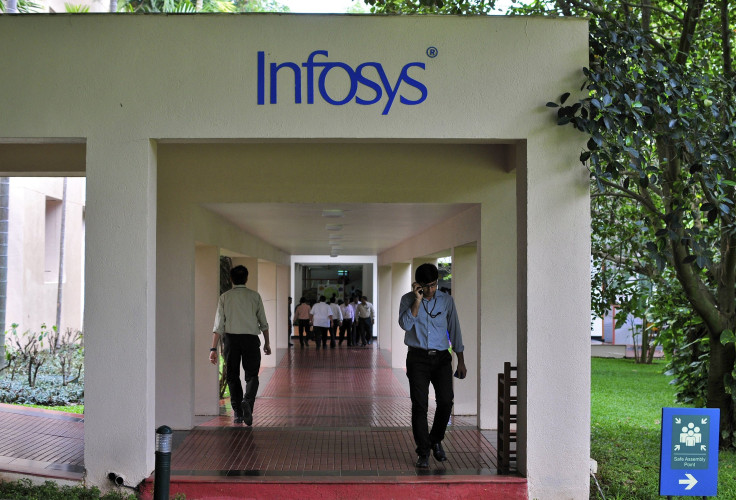Jack Palmer’s New Infosys Lawsuit Shows Indian IT Industry’s Visa Troubles Won’t Go Away

Jack Palmer, the former Infosys Ltd. employee whose lawsuit alleging harassment by the Indian IT services provider was thrown out in 2012, has filed a new suit against the company. The move highlights the $118 billion outsourcing industry’s woes that arise from its dependence on American work visas.
The new lawsuit, filed in New Jersey District Court on Oct. 2, names Infosys, founder Narayana Murthy, former CEO SD Shibulal and others as defendants. In the original whistleblower lawsuit, which a court in Alabama threw out, Palmer had claimed he was harassed by Bangalore-based Infosys for pointing out alleged wrongful use of certain types of short-term work visas.
“Palmer's current complaint in the United States District Court in New Jersey is a repetition of issues that were tried and dismissed by a federal court in 2012," Infosys said in an emailed statement to International Business Times on Monday. “Palmer resigned in 2013 November and released the company from the charges he has alleged in the complaint. We believe this is without any legal merit and will vigorously defend this complaint. We expect the issue to be resolved at the earliest.”
India’s IT outsourcing industry, which includes large India-based centers of U.S. multinational companies, takes advantage of the H-1B visa to place short-term work visa holders at client sites in the U.S. when required, avoiding the costlier option of hiring U.S. citizens locally. The non-immigrant visa allows skilled workers to work in the U.S. for up to six years. The practice has attracted close scrutiny from U.S. lawmakers, including visa fee increases and a Justice Department investigation that Infosys settled for $34 million last year. There are ongoing attempts to change the rules governing H-1B visas such as those proposed in the larger immigration overhaul being debated in Congress.
Changes proposed to H-1B rules were only one part of the bill S. 744, titled Border Security, Economic Opportunity, and Immigration Modernization Act, introduced in the spring of 2013 by a bipartisan group of eight senators, with Sen. Charles Schumer as the main sponsor. The bill seeks to overhaul America’s immigration system, from securing its borders to fixing the status of some 11 million illegal immigrants.
Changes to the H-1B visa program could include barring any company, which has more than 15 percent of its staff holding H-1B or L1 visas, from placing those staff at client sites in the U.S. Instead, the company would have to use locally hired Americans. The L1 visa is another type of non-immigrant work visa used mostly for intra-company transfers.
This would directly hit the Indian IT outsourcing model, which relies heavily on H-1B visas. Typically, two-thirds of the staff of Indian IT companies in the U.S. are those imported on these visas. The ban would mean either providing services from outside the U.S. or hiring locals, which would in turn mean a higher cost of doing business.
The House of Representatives was looking to debate its own version of the bill, passed by the Senate in June 2013, even as the Indian IT industry lobbied Washington hard to water down those proposals. However, events including House Majority Leader Eric Cantor’s defeat in the Virginia primaries overtook the lower house’s debate on the bill, diminishing the prospect of the proposals becoming law soon.
“We’re certainly not assuming it (immigration reform) as dead or gone away, we’re viewing it more as postponed,” Gordon Coburn, president of Cognizant Technology Solutions Corp., told investors in a meeting organized by Deutsche Bank on Sept. 10.
Cognizant, with the bulk of its staff in India, and its Indian rivals such as Tata Consultancy Services Ltd. and Infosys, are among the biggest beneficiaries of the H-1B visa program.
“Immigration bill, though it is still not off the table, there is not much noise in the last couple of quarters, but with the mid-term elections you could again see noise levels building up,” Rajiv Bansal, chief financial officer of Infosys, told investors at a conference organized by brokerage CLSA Ltd. in Hong Kong on Sept. 14. He was, however, speaking in the context of why it’s important for Infosys to maintain a large cash reserve.
A second, less onerous, change proposed was that companies must progressively reduce the proportion of their U.S. staff holding non-immigrant visas (predominantly H-1B and some L1 visas) from the fiscal year after 2016. At most, 50 percent of their U.S. staff could be non-immigrants and the other half must be U.S. citizens.
The current annual cap on the number of H-1B visas awarded is 65,000, with an additional 20,000 that can go to graduates of advanced degrees from U.S. universities. This is for the fiscal year 2015 that begins Oct. 1 this year. The immigration bill, however, includes provisions to raise the cap to as much as 180,000. U.S. Citizenship and Immigration Services said on April 7 that it had received enough applications to hit the cap for the current year, and a computer-generated random selection process will be used to select those who get the visas.
Palmer’s original lawsuit that was dismissed included an allegation that Infosys misused another type of visa, the B-1 visa, to send IT staff from India to U.S. client sites, though such visas can only be used for purposes like business meetings and not for billable work.
© Copyright IBTimes 2024. All rights reserved.






















